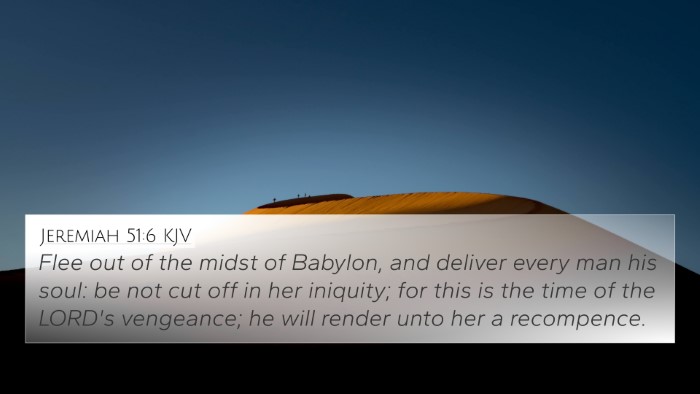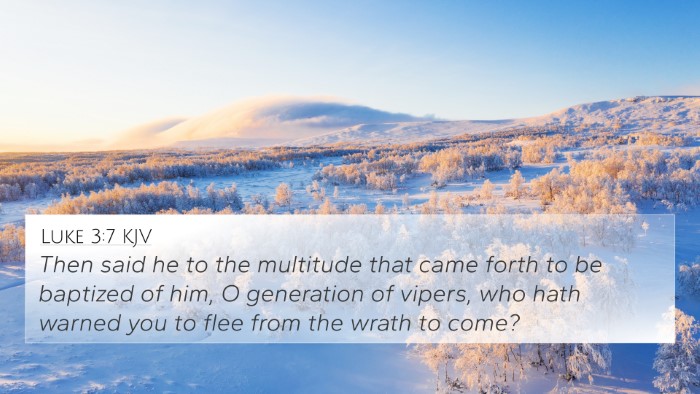Understanding Jeremiah 48:6
Jeremiah 48:6 states: “Flee, save your lives! Be like the juniper in the desert.” This verse speaks of urgency and the need for salvation amidst impending judgment upon Moab due to their actions and attitudes. Below, we will explore the meaning of this verse by combining insights from prominent public domain commentaries.
Contextual Overview
To understand Jeremiah 48:6, it's essential to consider the broader context of the Book of Jeremiah. This portion of scripture addresses the impending doom of Moab, a nation that was proud and had turned away from God. The call to flee signifies an imminent danger, urging individuals to save themselves from the consequences of their actions.
Commentary Insights
- Matthew Henry: Henry emphasizes the need for the people of Moab to flee from their fate, suggesting that their proud and obstinate nature led them to this dire situation. He reflects on the symbolism of the juniper, which grows in desolate places, indicating the void left by their lost prosperity.
- Albert Barnes: Barnes points out that the imagery of fleeing is meant to reflect the seriousness of the coming calamity. He notes that the juniper in the desert signifies a place of desolation and serves as a warning for the people to escape before it is too late.
- Adam Clarke: Clarke discusses the metaphor of the juniper tree, highlighting how it symbolizes survival in harsh environments. He interprets this imagery as a call for repentance and a reminder that even in the desert, there is hope if one seeks refuge in God.
Thematic Connections
This verse can be linked thematically with several other biblical scriptures that discuss the need for fleeing from danger, seeking refuge, and the importance of repentance. Here are some cross-references that provide deeper insights:
- Isaiah 16:4: Offers a similar call for Moab to seek refuge, emphasizing the importance of sanctuary amidst turmoil.
- Lamentations 3:26: Speaks to the idea of waiting quietly for salvation, reinforcing the theme of seeking God in distress.
- Matthew 24:16: Jesus advises fleeing in times of tribulation, echoing the call to save oneself.
- Luke 21:21: Similar to Matthew, this verse exhorts the faithful to flee Jerusalem when danger arises.
- Revelation 18:4: Calls God's people to come out of Babylon, another warning to escape impending judgment.
- Proverbs 18:10: Indicates that the name of the Lord is a strong tower; the righteous run to it and are safe.
- Psalm 37:39-40: Describes how the Lord helps the righteous in times of distress, reinforcing the hope offered even in difficult times.
- Romans 10:13: Affirms that everyone who calls on the name of the Lord will be saved, emphasizing the importance of seeking divine refuge.
- 2 Corinthians 6:17: Encourages believers to come out from among unbelievers, reflecting the theme of separation from judgment.
- Hebrews 6:18: Talks about the hope offered to us as an anchor of the soul, linking back to the idea of seeking safety in God.
Cross-Referencing Biblical Texts
Cross-referencing biblical texts is a valuable tool for deeper understanding and thematic exploration. Here are some tools for Bible cross-referencing that can aid in further study:
- Bible Concordance: A helpful resource for identifying specific verses related to themes or keywords.
- Bible Cross-Reference Guide: Detailed guides often accompany study Bibles and provide easy navigation between related verses.
- Cross-Reference Bible Study: Structured methods for exploring connections between verses.
- How to Use Bible Cross-References: Strategies for employing cross-references in personal study and sermon preparation.
- Bible Reference Resources: Online tools and apps that help find, link, and analyze Bible verses.
Conclusion
Jeremiah 48:6 serves as a poignant reminder of the urgency of seeking refuge from impending judgment while also highlighting God's offer of hope and salvation amidst despair. Through cross-referencing related scriptures, we can enrich our understanding of this verse and the overarching themes within Scripture. Engaging in comparative Bible verse analysis enhances our study and enriches our faith journey.
As you explore the connections between Bible verses, consider using a Bible cross-reference system to deepen your insights and facilitate a comprehensive understanding of biblical themes. Remember, the process of cross-referencing not only adds layers to interpretation but also fosters a deeper engagement with the text of Scripture.












